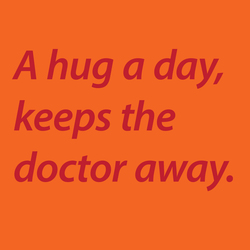My father died in a car accident when I was two years old. Being the only child in my little family, I grew up in a rather feminine environment. I had a fantastic mother and a great aunt, who both taught me what I needed to learn. About life, love, and hugs. In my world hugging was a natural part of my everyday life, an expression for trust, gratitude, and care.
There are many benefits of hugging. Research shows that hugging is extremely effective at healing sickness, disease, loneliness, depression, and stress. It also encourage understanding and empathy between people, resulting in improved synergy.
It seems to be a correlation between hugs and a successful career, a correlation that for many people is obvious. We know that hugs increase oxytocin, lower blood pressure, and decrease cortisol. This is extremely important for us in order to live a good and healthy life. Which in turn affect our career in a positive way. A healthy body, a healthy mind, and healthy relationship all contribute to overall career success.
However, it might also be problematic, because there are people who can't stand or even loathe hugging. They feel that hugging does not respect their personal space, and for sure has nothing to do in the workplace. Actually there are groups promoting to ban hugging from the workplace, something that seems quite radical for both people and workplaces where hugging is a natural part of the culture.
Dr. David Holmes, a scientist in charge of a study at Manchester Metropolitan University, concluded that in some cultures: "Political correctness is partly to blame as we have been conditioned not to touch anyone anymore as it can easily be deemed inappropriate." But as human beings, we need body contact. The study at Manchester Metropolitan University concluded that as many as one third of the participants never was touched on a daily basis, but that more than three fourths of the people involved responded that they would really appreciate being hugged more than they already did.

Personally I have always been a hugger, both at work and in private life. In the earlier years of my career, my hugs sometimes came as a surprise to colleagues or business relations. But the outcome has always been positive. However, I respect that not all people are huggers. I am always cautious about reading the situation, and ensure there is a common understanding that a hug is OK -- before we hug.
I am happy to see that during the last couple of years hugging seems to become a natural part of business behavior. Especially in Scandinavia. Also the appearance of hugging between male co-workers or friends is increasing. In particular, we see that many of the younger, modern, and more open leaders initiate a hug after we´ve been working on important matters. Both men and women. These leaders seem to be more at ease with themselves and in contact with their own feeling.
Virginia Satir, a respected family therapist once said, "We need four hugs a day for survival. We need eight hugs a day for maintenance and we need twelve hugs a day for growth." Something to think about?
We should not take hugging for granted, as Dr. David Holmes says "these days we are just too busy to hug." It is totally up to you, and if you like hugs, hugging might grow your personality, improve your relationships and your career. Go for it!
Questions to reflect upon:
- How many hugs a day do get? How many do you want?
- And how many are you giving?
- Have you ever experienced any awkward situations while hugging? Or, surprisingly positive situations?
Copywrite image 1: Geir Dokken/KK
Copywrite image 2: Brainwells

